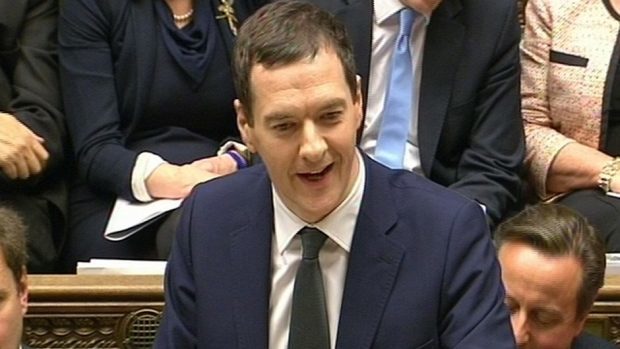George Osborne was accused last night of abandoning the North Sea as he announced UK oil and gas revenues are predicted to plummet by 94% this year.
The Tory chancellor unveiled the Office for Budget Responsibility’s devastating projection as he delivered his spending review and Autumn Statement in the Commons.
In other bad news for the north-east, it emerged a £1billion competition to develop carbon capture and storage (CCS) – for which a world-leading Peterhead scheme was in the running – has been axed.
To jeers from the opposition benches, the chancellor also made a “humiliating” U-turn on his plans to cut working tax credits, recently defeated by peers.
Addressing MPs from the dispatch box, Mr Osborne described the Conservatives as the “guardians of economic security, the protectors of national security and the builders of our better future”.
He also said the Tories were the “mainstream representatives of the working people of Britain”.
But his opposite number John McDonnell insisted voters should feel “betrayed” by the government’s failure to meet its promises to eliminate the deficit and get debt falling.
The shadow chancellor stunned the House by quoting the founder of communist China during his response, at one point tossing a copy of chairman Mao Tse-tung’s Little Red Book across the table between the two front benches.
Mr Osborne said Scotland would have been having its own spending review this autumn if it had voted for independence.
He said: “With world oil prices falling, and revenues from the North Sea forecast by the Office for Budget Responsibility (OBR) today to be down 94%, we would have seen catastrophic cuts in Scottish public services.
“But thankfully Scotland remains a strong part of a stronger UK.”
Former Scottish secretary Alistair Carmichael agreed the Nationalists’ case for independence had now been “blown to smithereens”.
The OBR’s economic and fiscal outlook which accompanies the review estimates the revenues from UK oil and gas in 2014-15 at £2.2billion.
It forecasts this will crash to £0.1billion in 2015-16, a drop of about 95%. Officials later clarified the chancellor had used the actual figure for 2014-15.
Industry representatives and politicians immediately rounded on Mr Osborne demanding to know what he would do to help the beleaguered sector.
Ian McLelland, analyst at Edison Investment Research, said: “The Treasury is abandoning the UK’s struggling oil and gas industry.
“The statement offers no material support to combat the pain of sustained low oil prices or arrest the plummeting levels of investment we expect to see across the industry.
“We fear that without short-term fiscal support the government is closing the door early on much of the UK’s remaining offshore reserves, possibly never to be opened again.”
SNP energy spokesman Callum McCaig said many people would feel as if their pleas for support had been ignored.
The Aberdeen South MP added: “There was no mention of exploration incentives for the sector, instead it was ridiculed for a drastic fall in revenue from a government who have moved at a snail’s pace to support it.”
He welcomed the announcement that the Oil and Gas Authority would be allowed to look into operators’ decommissioning plans.
But he insisted it did not relieve his concerns that billions of pounds could be lost to businesses overseas.
A spokesman for Scottish Finance Secretary John Swinney said the Tories should be apologising for their part in not saving a single penny of Scotland’s vast oil revenues over the last 40 years.
But Mike Tholen, Oil & Gas UK’s economics director, struck a more optimistic tone, underlining the need to work with the Treasury on additional measures, including revisiting the current headline tax rate.
He said the OBR figures underscored the severity of the challenge, but failed to take into account the indirect contribution the industry made as a major employer, innovator and exporter of goods and services at home and abroad.
Later in his speech, Mr Osborne said the Scottish Government’s block grant would reach almost £30billion by 2019-20, highlighting an increase in capital funding of £1.9billion.
And he confirmed the fiscal framework to accompany the Scotland Bill was “now ready”, adding: “The ball is in the court of the Scottish Government.”
